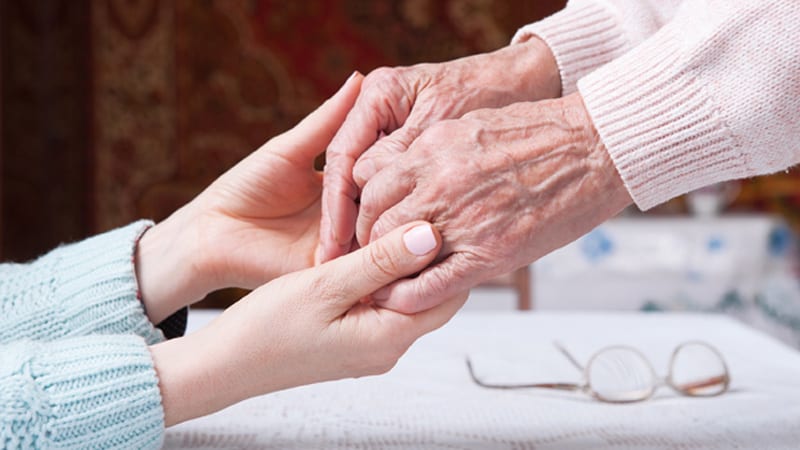The Intimacy of Caregiving: The Heart Expands
Writer Betty Booker gives some advice on caring for aging relatives.
Retired reporter and columnist for the Richmond Times-Dispatch and … family caregiver for several relatives, currently her cousin, Nancy.
WHAT WORKED: Patience, perseverance, prayer and pursuing information about Alzheimer’s care.
WHAT I’D DO DIFFERENTLY: Move into assisted living sooner, turn over paperwork to a bonded, insured pro.
THE UNEXPECTED SILVER LINING: “Discovering that people with dementia continue to evolve and retain the essence of themselves.”
STORY BY BETTY BOOKER
I was raised to be an old maid family caregiver. The firstborn of five siblings, I was named for my maiden great-aunt, whose operatic career was cut short to take care of family.
I rest my case.
The maiden script requires taking care of others without the “distractions” of a mate, offspring or personal interests. However, I’ve been married twice, and the current union thrives. So much for the old-maid bit.
Marital status is peripheral to such caregiving anyway. Some people step up to tasks at hand; others, not so much. Even men, who today more than in previous eras, step in to take on caregiving.
THE HUMAN CONDITION PROMOTES ASSISTANCE
For spousal care, love and compassion combine with willingness and moral responsibility to sustain most couples in such strenuous tasks. Of course, compassion also underpins much extended family caregiving, but we’ll get to that in a minute.
Many cultures expect women, single or not, to care for incapacitated parents, grandparents, in-laws, siblings and extended kin until death do you part: theirs – or yours if the strains of the jobs take you first.
At some point, I realized that the human condition promotes mutual assistance. We evolve as individuals, and species, when we pool our efforts. Plus, the heart expands beyond narrow self-focus. This is my experience. I’m grateful for it.
My current enterprise as family caregiver is for my cousin, who had no other kin able to walk with her during Alzheimer’s long goodbye.
She and various relatives I have assisted have taught me some lessons that otherwise I might not have learned. I offer them in the hope that you don’t make my mistakes, and that you see the good in helping.
DON’T EXPECT THANKS
A caregiver’s foremost job is to focus on safety and health for those who can’t manage their lives by themselves.
Helping, however, does not mean being a doormat on which recipients wipe ungrateful feet with unending demands that have little to do with necessity or respect for your limitations.
You might think that statement unnecessary. Alas, no. Thanks may be expected from the person on the receiving end. Yet I often hear that kindnesses are not only unappreciated but also are met with disagreeableness and more demands.
Such folk rarely are appeased. Instead, decide what needs to be done that you are willing to do. Having struggled myself with such situations, particularly when trying to conserve their limited resources, I’ve concluded that it’s better to hire some assistance for which the person you’re helping pays.
On the other hand, as welcome as gratitude is, it isn’t necessary. If you assist out of compassion that arises from your own moral core, you will be rewarded by unpredictable grace and maturity. They may be a vector for learning forgiveness, from which comes profound freedom. Whether the other person learns is their choice.
YOU WILL HAVE A CRAZY LEARNING CURVE
You cannot effectively assist without being open to learning. There, I’ve said it, thus releasing years of jaw-dropping encounters with closed-minded caregivers who refuse to educate themselves. You can’t take care of yourself, much less another person, if you pretend to know everything about caregiving, self-care, support services and incapacitating medical conditions.
We Americans live at a crazed pace, with attention spans so truncated that we miss now on our way to later.
This isn’t how a disabled person lives, in my experience. They live in the present. Now is all we have, folks. The past exists only in current memory. The future isn’t here yet.
Absorbing this lesson may be the biggest gift of caregiving.
On a recent Sunday afternoon, I saw an elegant 90-something widow who was sitting alone at a small table in front of a window overlooking an enclosed garden. She was fingering a piece of a cookie. Over and over. Smiling peacefully as daylight faded.
“Look how content she is. Holy, really,” I thought, and then said aloud to her devoted daughter: “She’s well taken care of. We worry so much about losing our minds. Maybe it’s enough to just be.”
Betty Booker is a retired Richmond Times-Dispatch reporter and columnist.


